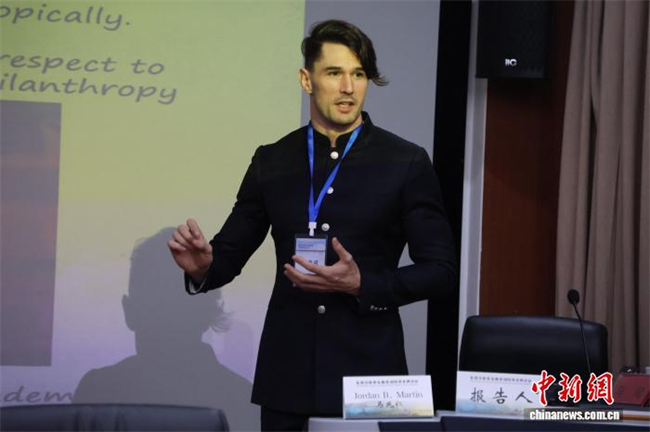When Martin was about to begin his postgraduate studies at the academy in 2012, he first encountered this rule. "I naively assumed it urged students to enrich their knowledge of physics," he recalled.
Reflecting on this experience in a recent interview with China News Service, Martin noted that a lack of deep engagement with classical texts can result in misunderstandings of their original intent. He believed that focusing solely on classical learning may result in another pitfall: failing to connect philosophical insights from ancient writings with contemporary knowledge. "Finding this balance is one of the things I reflect on daily," he said.
After completing his undergraduate studies in Australia, Martin came to Yuelu Academy, where he spent over a decade for his master's, doctoral, and postdoctoral studies. Since 2024, he has been serving as a faculty member at the academy.
"The unique charm of Yuelu Academy lies in its narrative of millennia-old cultural heritage," Martin explained. "That's ultimately why I chose to stay." To him, this "powerfully compelling narrative" stems from the academy's deep historical roots.

The photo, taken on September 18, shows a view of Yuelu Academy at Hunan University. (Photo/Zeng Yue)
For centuries, Yuelu Academy has upheld its educational mission of "being committed to imparting wisdom for the benefit of the people, ensuring scholarly studies geared to current needs and of practical value to national affairs." Over 800 years ago, the famed debate between Southern Song philosopher Zhu Xi and Zhang Shi, then dean of the academy — known as the "Zhu-Zhang Discourse" — went down in history as a tale admired by all. It established a tradition of open lectures by scholars from different schools at Yuelu Academy and set an example of exchanges, dialogue, and seeking common ground while respecting differences.
Today, as a college subordinate to Hunan University, Yuelu Academy maintains its cultural foundations while embracing innovation and international engagement. From inviting overseas sinologists to deliver lectures to hosting international academic conferences and collaborating with foreign universities and research institutions, the academy provides fertile ground for dialogue among civilizations.
Inspired by this academic atmosphere, Martin has devoted himself to exploring the connections between natural science and pre-Qin philosophy. During his master's studies, he interpreted philosopher Zhou Dunyi's philosophical ideas through quantum theory, using mainstream interpretations of quantum mechanics to illuminate concepts such as "unity of heaven and humanity, and non-duality of subject and object." In his doctoral research, he analyzed the similarities and differences between the Confucian classics Mencius and Xunzi from an evolutionary perspective, arguing that discourses on human nature in classical texts must be contextualized within the reality of humans as evolved beings.
"To revitalize fine traditional culture for today's world, we must do more than study ancient texts in isolation or be armchair strategists," Martin said. "We must also confront the philosophical implications brought forth by new discoveries in physics and biology."

The photo, taken on September 27, shows Jordan B. Martin giving a presentation at the International Conference on Classical Studies in Eastern and Western Philosophy hosted by Zhengzhou University. (Photo provided by the interviewee)
He believes that although disciplines are defined by specific criteria and adopt different methodologies, all things in the world are inherently interconnected — a concept captured in English by the term consilience, meaning "knowledge integration".
Thus, Martin sees the process of identifying complementary meanings between Chinese and Western philosophy as a "slow yet pleasurable journey." Through this work, he has come to realize there are no fundamental, insurmountable differences between Eastern and Western ways of thinking.
"Human beings inherently share many common traits," Martin said. This shared foundation not only explains what draws him to Chinese culture and philosophy but also reflects the essence of exchanges and mutual learning between different cultures and philosophical traditions in the world. To preserve heritage while embracing global perspectives, and to uphold tradition while integrating new knowledge — these are the values he has continually reinforced during his time studying and teaching at Yuelu Academy.
Now, Professor Martin teaches courses in Western philosophy and comparative philosophy. He hopes to eventually offer a new course exploring how evolutionary science updates, challenges, and inspires key themes in both Chinese and Western philosophy. "I want to offer our students fresh perspectives, and contribute in my small way to the ongoing reinterpretation of China's fine traditional culture," he said.
This article is from the Hunan Provincial Government www.enghunan.gov.cn.
He believes that although disciplines are defined by specific criteria and adopt different methodologies, all things in the world are inherently interconnected — a concept captured in English by the term consilience, meaning "knowledge integration".
Thus, Martin sees the process of identifying complementary meanings between Chinese and Western philosophy as a "slow yet pleasurable journey." Through this work, he has come to realize there are no fundamental, insurmountable differences between Eastern and Western ways of thinking.
"Human beings inherently share many common traits," Martin said. This shared foundation not only explains what draws him to Chinese culture and philosophy but also reflects the essence of exchanges and mutual learning between different cultures and philosophical traditions in the world. To preserve heritage while embracing global perspectives, and to uphold tradition while integrating new knowledge — these are the values he has continually reinforced during his time studying and teaching at Yuelu Academy.
Now, Professor Martin teaches courses in Western philosophy and comparative philosophy. He hopes to eventually offer a new course exploring how evolutionary science updates, challenges, and inspires key themes in both Chinese and Western philosophy. "I want to offer our students fresh perspectives, and contribute in my small way to the ongoing reinterpretation of China's fine traditional culture," he said.
This article is from the Hunan Provincial Government www.enghunan.gov.cn.
Translator: Kuang Zhenzhen
Chinese source: Chinanews








